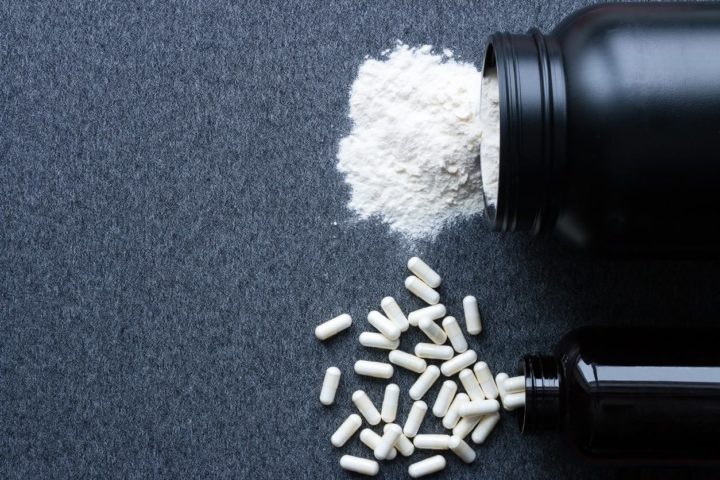One of the more common questions we get is: Should I pick a pre-workout with creatine (and how much)?
Let’s dig into the details.
Creatine helps to regenerate energy during exercise rapidly. It is especially effective during bursts of high-intensity workout or sprint-like sporting performance. The ability of creatine to help regenerate energy depends largely on creatine stores within your muscles. And you can increase these muscle stores by 20-40% through daily supplementation.
Some intelligent guys might respond: “Yeah, but timing doesn’t matter with creatine. So why include it in a pre-workout?”
We think it makes sense to include it in your pre-workout because most people live busy lives and don’t like the mental load of remembering and measuring out a dozen or more different supplements per day. For many people the goal is to find a single, robust all-in-one performance enhancing pre-workout for the everyday athlete, loaded with the most effective scientifically proven ingredients.
And it turns out that creatine monohydrate is the most highly studied dietary supplement ever. It is exceptionally well-researched, but it is also highly effective for men and women.
https://pubmed.ncbi.nlm.nih.gov/28615996/
In fact, in the latest review of creatine monohydrate from the International Society of Sports Nutrition, we read, “Creatine monohydrate is the most effective ergogenic nutritional supplement currently available to athletes to increase high-intensity exercise capacity and lean body mass during training.”
https://pubmed.ncbi.nlm.nih.gov/28615996/
So, what is creatine and what does it do?
Creatine is a compound made up of three amino acids – arginine, glycine, and methionine. It is predominantly stored as creatine and phosphocreatine in our skeletal muscles, but small amounts are also present in cardiac and smooth muscle, brain, bone, and testes (in males).
Among several other potential mechanisms of action, phosphocreatine acts as a high-energy phosphate reserve that is used to convert ADP back to ATP rapidly. In other words, creatine facilitates rapid energy regeneration during exercise, particularly during bursts of high-intensity performance.
Our bodies store a natural but limited supply of phosphocreatine in the muscles. But this natural supply limits exercise capacity during intense workouts because the ability of creatine to boost performance depends on its concentration within the muscles.
The good news is that supplementation of creatine can increase muscle creatine stores by 20-40% in most individuals, thus increasing the limit on exercise capacity. While many pre-workouts and energy drinks will sprinkle in some creatine just to say they have some, a 2-5 grams dose is needed to reap the benefits truly.
What are the benefits of having creatine in your pre-workout
Let’s think of this in two ways. First, what are the benefits of creatine for working out? And second, why include it in a pre-workout and not just take it separately.
As we noted, the benefits of creatine monohydrate supplementation are well researched and clear. Creatine has repeatedly been shown to improve exercise performance across several different types of activities without any adverse side effects noted in the research.
So what does creatine do for athletes? The most notable benefits include:
– improves high-intensity training
– benefits athletes in sports that involve repeated sprints like basketball and soccer
– when combined with a resistance training program, it helps bring gains in muscle size and strength
– growing evidence that creatine monohydrate supplementation can aid brain and bone health.
https://pubmed.ncbi.nlm.nih.gov/30086660/
https://pubmed.ncbi.nlm.nih.gov/30978926/
Does Timing Matter With Creatine?
No, timing does not matter with creatine as long as you get 2-5g daily to top your muscle stores.
So if timing doesn’t really matter with creatine, why include it in a pre-workout? The reason is simple: to make it easy for more everyday athletes to reap the benefits of the most effective natural sports performance supplement currently known by science.
Sure, if you’re a supplement guru and like remembering doses and measuring out every supplement individually, you wouldn’t put creatine in your pre-workout. But most people don’t want that mental burden. Most of us want the simplicity of the perfect pre-workout.
Are there other forms of creatine superior to creatine monohydrate?
There has not been (and most likely never will be) a form of creatine shown to be superior to creatine monohydrate.
You can assume that companies put other forms of creatine in their pre-workout as a marketing gimmick or charge you more money. There is no scientific reason to suggest using any form of creatine other than creatine monohydrate.
Is loading creatine necessary?
The old-school recommendation to have a loading phase of 20-25 grams per day for a week is unnecessary unless there is an urgent need to achieve full muscle creatine saturation very rapidly. You can do it, but it is not necessary. The key is daily supplementation, as the creatine stores in your muscles will grow over time.
In fact, within about a month, daily supplementation with 2-5 grams of creatine monohydrate per day will saturate muscle creatine stores to the same degree as a loading phase.
How Much Creatine Should I Take?
For a long time 2-5g has been the recommended daily dosage. However, recent research has shown that benefits continue up to 10g and perhaps even further. So if you’re really looking to max out the benefits, consider 10-15g per day.
